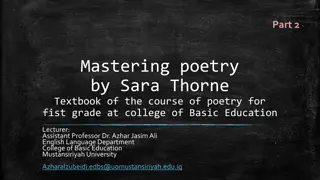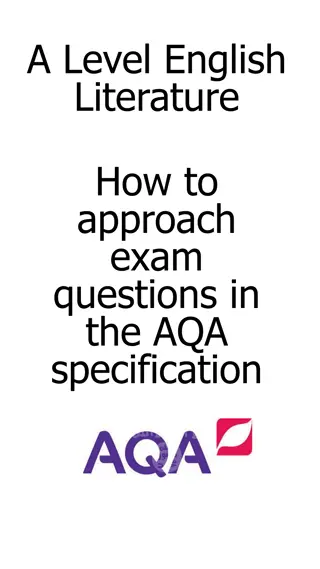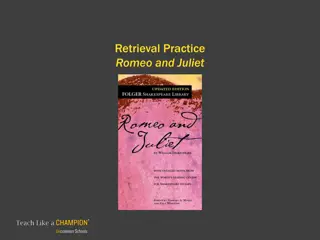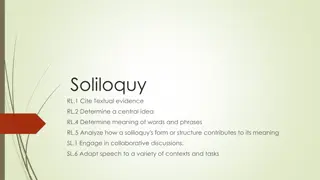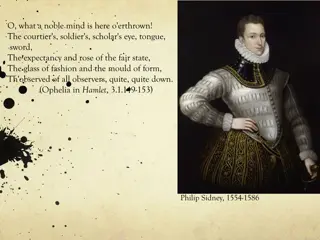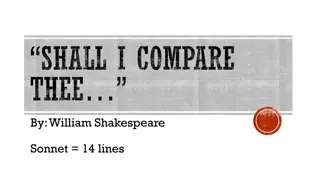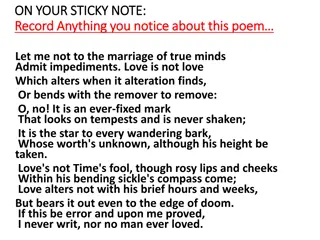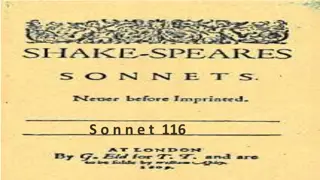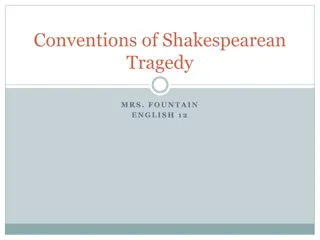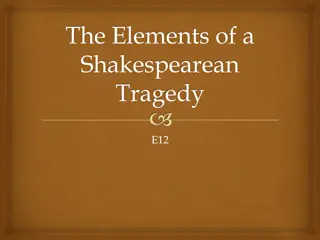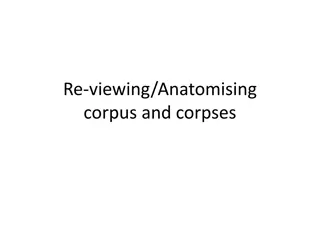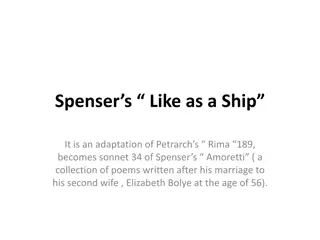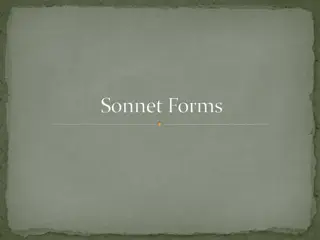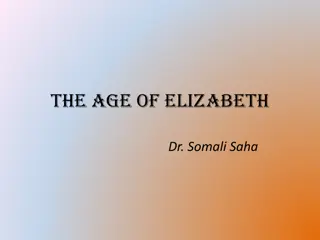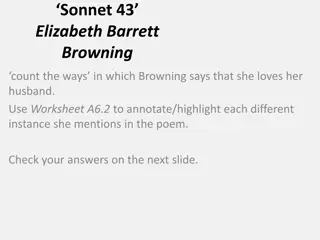Analysis of Sonnet 65 by William Shakespeare
Sonnet 65 by William Shakespeare explores the theme of Time as a powerful force that defies all earthly materials. The poet contemplates how beauty, no matter how strong, will ultimately succumb to Time's relentless passage. The sonnet delves into the idea of immortality through poetry, suggesting t
0 views • 6 slides
Exploring Shakespearean Language and Hip-Hop Connection
Dive into the similarities between Shakespearean language and hip-hop, understanding iambic pentameter, exploring the essence of hip-hop, the five elements associated, and the significance of teaching Shakespeare in modern education.
0 views • 28 slides
Analysis of Love and Devotion in Sonnet 43 by Elizabeth Barrett Browning
Sonnet 43 by Elizabeth Barrett Browning portrays intense love and unwavering devotion as the speaker expresses a deep connection with her lover, describing their love as spiritual and boundless. Through analysis of language, structure, and form, the poem reveals the speaker's profound emotions, the
2 views • 17 slides
Understanding Shakespearean Sonnets: A Beginner's Guide
Explore the world of Shakespearean sonnets in this informative guide. Learn about the structure, meter, and rhyme scheme of these 14-line poems written in iambic pentameter. Discover the beauty of iambic pentameter and its significance in Shakespeare's works. Dive into the rhythm and heartbeat of so
3 views • 15 slides
Exploring the Art of Sonnets in Poetry
Delve into the world of sonnets with a focus on Petrarchan and English sonnet forms. Understand the structure, rhyme schemes, and themes these poetic forms offer through examples like Shakespeare's Sonnet 116. Discover the timeless appeal and influence of sonnets in Western literature.
2 views • 12 slides
Approach to Exam Questions in AQA A-Level English Literature
Learn how to effectively approach exam questions in AQA A-Level English Literature focusing on the types of questions, especially in Paper 1 (Aspects of Tragedy) and Paper 2 (Social and Political Protest Writing). Understand the significance of Shakespearean extracts, explore tragic trajectories, an
0 views • 28 slides
Understanding Shakespeare's Extracts for WJEC A-Level English Literature Unit
Explore strategies for analyzing Shakespearean extracts effectively in the WJEC A-Level English Literature Unit, focusing on key points, detailed support, verbatim recall of critical views, and interpreting context. Learn how to prepare and respond to the Shakespeare extract questions, emphasizing c
0 views • 19 slides
Shakespearean Retrieval Practice for Students
Explore key facts and insights related to Shakespeare and his works through retrieval practice questions and answers. Test your knowledge on topics like Elizabethan England, sonnets, soliloquies, and literary devices used in Romeo and Juliet. Enhance your understanding of Shakespearean literature in
0 views • 20 slides
Analysis of Shakespeare's Sonnet 60: Time and Mortality
Shakespeare's Sonnet 60 delves into the universal themes of time and mortality through vivid imagery and poignant reflections. The poem uses concrete images like waves and minutes to symbolize time's relentless progression and its impact on human life. As the sonnet progresses, the poet contemplates
2 views • 14 slides
Understanding Shakespearean Soliloquies: Language and Analysis
Explore the world of Shakespearean soliloquies through a comprehensive look at language, structure, and meaning. Dive into the nuances of Shakespearean vocabulary, grammar, and syntax to interpret and analyze the essence of soliloquies. Unravel the beauty of blank verse and learn essential tricks fo
4 views • 10 slides
GCSE English Literature Exam Overview
This GCSE English Literature exam overview provides details on the components, assessment objectives, text choices, and key information for students. It covers Shakespeare, Poetry, Post-1914 Prose/Drama, 19th Century Prose, and Unseen Poetry. Students will engage with a variety of texts ranging from
5 views • 23 slides
Insights into the World of Shakespearean Literature by Dr. Heward Wilkinson
Explore the intriguing world of Shakespearean literature through the eyes of Dr. Heward Wilkinson. Delve into discussions on authorship, mimesis, and the depth of characters in Shakespeare's plays, presented with insightful images and thought-provoking quotes.
0 views • 20 slides
Insights into Characters in Shakespearean Tragedies
The witches in Macbeth set a tone of foreboding and deception with their choral lines, while Lady Macbeth is portrayed as ruthless and driven by ambition. Macbeth struggles with the consequences of regicide, and Lady Macbeth descends into guilt-induced madness. In contrast, Juliet in Romeo and Julie
0 views • 20 slides
Shakespeare's Sonnet 60 Analysis and Insights
Shakespeare's Sonnet 60 is a poignant reflection on the passage of time and mortality. The poem vividly captures the relentless march of time, likening it to the waves steadily approaching the shore. Through concrete imagery and powerful metaphors, the sonnet explores the fleeting nature of youth, b
0 views • 12 slides
Understanding Rhetoric and Characterization in Shakespearean Works
Delve into the realm of rhetoric, exploring the concepts of logos, pathos, and ethos alongside the art of persuasion through language. Uncover the nuances of blank verse in Shakespearean poetry and the significance of characterization in revealing the depths of characters in his plays.
7 views • 32 slides
Sonnet to the Moon by Sir Philip Sidney: A Poetic Ode to Unrequited Love
Born in 1554, Sir Philip Sidney was an Elizabethan courtier, poet, and scholar. "Sonnet to the Moon" from his work "Astrophel and Stella" explores unrequited love through an address to the moon as a sympathetic observer. The poem reflects on the nature of love, beauty, and virtue. With eloquent imag
0 views • 9 slides
Analyzing "The Next War" by Wilfred Owen: A Sonnet of Death and Hope
Wilfred Owen's poem "The Next War" explores shifting perspectives on death and war among soldiers in the trenches, using a unique sonnet structure blending Italian and English forms. Through inclusive language and personification of Death, Owen highlights themes of camaraderie, courage, and the acce
0 views • 9 slides
Sir Thomas Wyatt and the Poem "Whoso List to Hunt
Sir Thomas Wyatt, a prominent figure in English poetry, is credited with popularizing the Petrarchan Sonnet in England. His poem "Whoso List to Hunt" reflects his feelings for Anne Boleyn, portrayed as a deer, and Henry VIII as "Caesar." Wyatt expresses his weariness in pursuing the elusive quarry,
0 views • 12 slides
British Renaissance Poetry and Prose: Influential Poets and Their Works
Explore the world of British Renaissance poetry and prose through the works of renowned poets like Sir Thomas Wyatt, Edmund Spenser, and Sir Philip Sidney. Dive into the evolution of the sonnet form, from Wyatt's introduction of the Italian/Petrarchan sonnet to Spenser's masterpieces like "The Faeri
1 views • 13 slides
Reflections on Honor, Valour, and War in Shakespearean Works
The selected passages from various Shakespearean plays delve into themes of honor, valour, and the ramifications of war. Characters like Ophelia, Cominius, and Prince Henry reflect on the complexities of courtly life, the virtues of valour, and the disruptive nature of conflict. Through these excerp
3 views • 17 slides
A Comprehensive Guide to Shakespearean Comedies: Tricks and Targets
Explore the world of Shakespearean comedies, delving into their definition, common characteristics, clowns and fools, societal reflections, and the thematic focus on marriage. Discover how these plays balance humor with dark themes, intricate plotlines, mistaken identities, and the role of witty foo
0 views • 8 slides
Analysis of Shakespeare's Sonnet: Shall I Compare Thee
Shakespeare's Sonnet "Shall I Compare Thee" explores the speaker's admiration for his beloved, claiming she surpasses the beauty of a summer day. The poem delves into themes of eternal love, beauty, and the inevitable fading of physical allure. Through vivid imagery and poetic devices, Shakespeare c
0 views • 12 slides
Analysis of "Glasgow Sonnet i" with Annotated Themes and Literary Devices
Glasgow Sonnet i" explores themes of decay, neglect, poverty, and social injustice in a tenement setting. The poem describes the external and internal aspects of the building, portraying a bleak picture of marginalized individuals living within it. Through vivid imagery and literary devices like per
0 views • 7 slides
Unveiling Shakespearean Tragedies: The Path of the Tragic Hero
Delve into the world of Shakespearean tragedies and explore the characteristics of the tragic hero, from Hamartia to catharsis. Discover how the downfall of these powerful figures leads to cathartic experiences for audiences, invoking emotions of pity and fear. Uncover the defining elements that mak
0 views • 18 slides
Masculinity in Shakespearean Tragedies: Ruined Identities and Emotional Conflicts
The selected excerpts from Shakespearean plays like "Romeo and Juliet," "Coriolanus," "Troilus and Cressida," "Antony and Cleopatra," and "Measure for Measure" portray a complex exploration of masculinity, where characters struggle with emotions, identity, and societal expectations. Masculine ideals
0 views • 21 slides
Exploring Shakespearean Sonnets: Understanding Love and Iambic Pentameter
Delve into the beauty and complexity of Shakespeare’s sonnets, focusing on the timeless theme of love and the rhythmic structure of iambic pentameter. Discover the essence of true love described as unwavering and constant amidst life’s challenges, and unravel the significance of iambic pentamete
0 views • 27 slides
Analysis of Shakespeare's Sonnet "Shall I Compare Thee to a Summer's Day
Shakespeare's Sonnet 18, "Shall I Compare Thee to a Summer's Day," explores the speaker's decision not to compare their beloved to a summer day due to the impermanence of summer's beauty. Instead, the sonnet praises the eternal beauty of the beloved, highlighting the depth of emotion and admiration
0 views • 15 slides
Understanding and Enjoying Poetry: Unraveling the Sonnet Form through Petrarch
Delve into the intricacies of interpreting poetry, specifically the sonnet form, focusing on the origins of the Italian sonnet and the influence of poets like Petrarch. Explore the complexities of Petrarch's sonnets in relation to love, inner conflict, and unfulfilled desires, shedding light on the
1 views • 39 slides
Shakespearean Sonnets: Love, Structure, and Life of William Shakespeare
Explore the depth of Shakespearean sonnets, their structure, and themes of love intertwined with the life events of William Shakespeare. From unrequited love to poetic expressions, delve into the fascinating world of sonnets and the renowned playwright's journey.
0 views • 16 slides
Analysis of Sonnet 18 by William Shakespeare
The famous Sonnet 18 by William Shakespeare praises the eternal beauty of the beloved. The poet compares the beloved to a summer day but highlights the beloved's superiority due to their enduring beauty. The sonnet explores themes of timelessness, love, and the power of poetry to immortalize beauty.
0 views • 8 slides
Exploring Shakespearean Soliloquies and Female Characters
Delve into the world of Shakespearean soliloquies, a device used in drama to reveal characters' innermost thoughts and feelings to the audience. Discover the uniqueness of Shakespeare's works, including his famous plays like Macbeth, Romeo and Juliet, and Hamlet. Explore the seven types of female ch
0 views • 14 slides
Exploring Shakespearean Tragedy: Conventions and Characteristics
Delve into the world of Shakespearean tragedy through the examination of key conventions such as the tragic hero, plot development, and themes. Understand the aspects of tragedy and drama, including blank verse, soliloquy, aside, dramatic irony, and foreshadowing. Discover how these elements come to
0 views • 10 slides
Exploring the Elements of Shakespearean Tragedy
Delve into the key components of a Shakespearean tragedy, from the concept of the tragic hero to the role of human flaws and responsibility. Discover how only great men qualify as tragic heroes and the significance of hamartia in leading to their downfall. Uncover the common qualities of the tragic
0 views • 15 slides
Reflections on Body and Identity Through Shakespearean Texts
Delve into the themes of body consciousness, identity, and mortality through excerpts from Shakespearean plays like Richard III and Hamlet. The text explores the nuances of physical appearance, inner turmoil, and societal perceptions, offering a profound reflection on the human experience.
0 views • 19 slides
Analysis of Spenser's Sonnet 34: "Like as a Ship" from Amoretti
Spenser's Sonnet 34 from Amoretti depicts a ship lost at sea as an analogy for the poet's estrangement from his wife, Elizabeth. Through vivid imagery and alliteration, Spenser conveys the despair of being adrift without his guiding light. The poem reflects themes of longing, forgiveness, and hope f
0 views • 7 slides
Exploring the History and Experience of The Globe Theatre
Delve into the rich history and unique experience of The Globe Theatre, an iconic Shakespearean venue located in Southwark, London. Learn about its construction in 1599, the tragic fire during a performance, its reconstruction in 1997, and the interactive elements that set Shakespeare plays at The G
0 views • 9 slides
Early Takes on the Warrior: Insights from Shakespearean Characters
Explore various perspectives on the role of a warrior through excerpts from Shakespearean plays like Hamlet, Coriolanus, Henry VI, and others. The characters reflect on valor, love for war, courtly duties, and the contrast between peace and war, offering profound insights on the true nature of warfa
0 views • 18 slides
Insights into Sonnet Forms and Origins
Explore the origins and intricacies of sonnet forms through the Petrarchan Sonnet by Francesco Petrarch and the Shakespearean Sonnet by William Shakespeare. Learn about the structure, rhyme schemes, and emotional depth of these poetic forms through exquisite examples and analysis.
0 views • 13 slides
The Literary Legacy of Elizabethan Era: Poetry, Drama, and Shakespearean Masterpieces
The Elizabethan Age marked a rich literary period with the emergence of new classicism and romanticism. Notable poets like Spenser, Donne, and Wyatt, along with pre-Shakespearean dramatists, paved the way for the renowned works of William Shakespeare. His poems and plays, ranging from comedies to tr
0 views • 11 slides
Analyzing Sonnet 43 by Elizabeth Barrett Browning
Explore the depth of love expressed in Sonnet 43 by Elizabeth Barrett Browning through an annotation and analysis of each instance she mentions how she loves her husband. Discover the intense emotions and emotive language presented in the poem, highlighting the cadences of expression and the freedom
0 views • 4 slides




